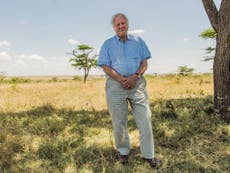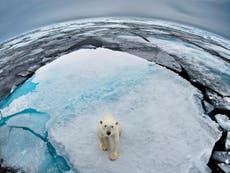Natural world being destroyed at rate ‘never seen before’, WWF warns as report reveals catastrophic decline of global wildlife
We are working with conservation charity Space for Giants to protect wildlife at risk from poachers due to the conservation funding crisis caused by Covid-19. Help is desperately needed to support wildlife rangers, local communities and law enforcement personnel to prevent wildlife crime
Your support helps us to tell the story
From reproductive rights to climate change to Big Tech, The Independent is on the ground when the story is developing. Whether it's investigating the financials of Elon Musk's pro-Trump PAC or producing our latest documentary, 'The A Word', which shines a light on the American women fighting for reproductive rights, we know how important it is to parse out the facts from the messaging.
At such a critical moment in US history, we need reporters on the ground. Your donation allows us to keep sending journalists to speak to both sides of the story.
The Independent is trusted by Americans across the entire political spectrum. And unlike many other quality news outlets, we choose not to lock Americans out of our reporting and analysis with paywalls. We believe quality journalism should be available to everyone, paid for by those who can afford it.
Your support makes all the difference.The natural world is in a “desperate” state, with global wildlife populations “in freefall” due to the impact of humans, according to one of the world’s most comprehensive examinations of biodiversity on our planet.
Wildlife charity WWF has said populations of mammals, birds, fish, amphibians and reptiles have collapsed by an extraordinary 68 per cent on average globally since 1970 - more than two thirds in less than 50 years.
The charity’s Living Planet Report 2020 paints a startlingly bleak picture of the rapid damage being wrought on Earth by modern civilisation, warning “nature is being destroyed by humans at a rate never seen before, and this catastrophic decline is showing no signs of slowing.”
The report finds intensive agriculture, deforestation and the conversion of wild spaces into farmland are among the main drivers of natural destruction, while overfishing is “wreaking havoc with marine life”.
Species overexploitation is also having a devastating impact on wildlife, according to the report. Direct causes of overexploitation include unsustainable hunting, poaching or harvesting, whether for subsistence or legal, and illegal, wildlife trade.
Indirect overexploitation occurs when non-target species are killed unintentionally, as this year in Uganda when the country’s rare and beloved silverback mountain gorilla, Rafiki, became collateral damage of hunters seeking out smaller animals.
The Independent’s Stop the Illegal Wildlife Trade campaign, launched earlier this year, seeks an international effort to clamp down on poaching and the illegal trade of wild animals.
Invasive species are also problematic for native species as they compete for space, food and other resources. Invasive species - which can enter a foreign environment innocently as a pet or in legal trade along with illegal trafficking - can turn out to be a predator for native species, or spread diseases that were not previously present in the environment. Humans also also major transporters of new diseases through global travel.
The decline has happened even faster than anticipated as recently as 2018, and the conservation charity warns “without urgent global action, life on Earth will be pushed to the brink.
Tanya Steele, chief executive at WWF, said: “We are wiping wildlife from the face of the planet, burning our forests, polluting and overfishing our seas and destroying wild areas.
“We are wrecking our world – the one place we call home – risking our health, security and survival here on Earth. Now nature is sending us a desperate SOS and time is running out.
She added: “In the UK we need to fast-track tough new nature laws that protect our wildlife at home and abroad, and with the COP26 summit in Glasgow next year the government has a huge opportunity to show global leadership in securing urgent commitments and action from world leaders.
“Only by putting the environment at the heart of our decision making can we build a safe and resilient future for nature, people and our planet.”
Some of the report’s most alarming findings include:
- A 94 per cent decline in the average size of wildlife populations in Latin America and the Caribbean, which is the sharpest fall of monitored animals anywhere in the world
- Freshwater species populations have seen a steep decline of 84 per cent including the critically endangered Chinese sturgeon in the Yangtze river, which is down 97 per cent
- In some parts of the world, endangered leatherback turtles have declined by between 20 per cent and 98 per cent, with an 84 per cent decline at Tortuguero beach in Costa Rica
- African elephant populations in the Central African Republic have declined by up to 98 per cent.
In the UK, populations of grey partridge have declined by 85 per cent and populations of Arctic Skua in Orkney have declined by 62 per cent.
The report also highlights that 75 per cent of all ice-free-land has been significantly altered by human activity, while almost 90 per cent of global wetlands have been lost since 1700.
But the report also says that well planned conservation efforts can protect some vulnerable species and ecosystems in various parts of the world. These include legal protection for forest elephants in Ghana, blacktail reef sharks in Australia and tigers in Nepal - all of which have resulted in significant population increases.
Sir David Attenborough has written an essay for the report on the vast impact of humans on the planet, which he says has resulted in the dawn of a new geological age - the Anthropocene.
Sir David said: “The Anthropocene could be the moment we achieve a balance with the rest of the natural world and become stewards of our planet.
“Doing so will require systemic shifts in how we produce food, create energy, manage our oceans and use materials. But above all it will require a change in perspective. A change from viewing nature as something that’s optional or ‘nice to have’ to the single greatest ally we have in restoring balance to our world.
“The time for pure national interests has passed, internationalism has to be our approach and in doing so bring about a greater equality between what nations take from the world and what they give back. The wealthier nations have taken a lot and the time has now come to give.”
The Living Planet Report is based on data from the Living Planet Index produced by the Zoological Society of London (ZSL), the charity which runs London Zoo.
Dr Andrew Terry, ZSL’s director of conservation, said: “The Living Planet Index is one of the most comprehensive measures of global biodiversity.
For this report, ZSL’s team tracked data on 20,811 populations of 4,392 vertebrate species. An average decline of 68 per cent in the past 50 years is catastrophic, and clear evidence of the damage human activity is doing to the natural world.
“If nothing changes populations will undoubtedly continue to fall, driving wildlife to extinction and threatening the integrity of the ecosystems on which we all depend. But we also know that conservation works and species can be brought back from the brink. With commitment, investment and expertise, these trends can be reversed.”




